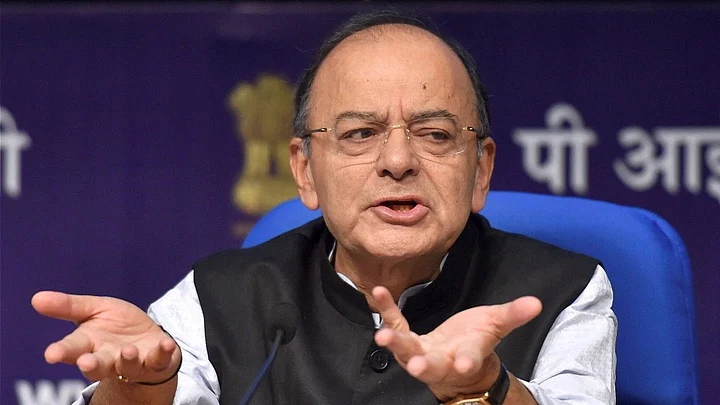The Centre on Tuesday announced a Rs 2.11 lakh crore bank recapitalisation plan for state-owned lenders weighed down by bad loans, seeking to stimulate the flow of credit to spur private investment.
A bulk of the capital – Rs 1.35 lakh crore – will come via the issue of recapitalisation bonds. The remaining Rs 76,000 crore, which includes Rs 18,000 crore already allocated under the Indradanush Recapitalisation Scheme, will come through budgetary support over two fiscal years.
The announcement comes as a relief for capital-starved banks which been struggling to provide for mounting stressed assets in the system. Bad loans in Indian banking system have crossed Rs 8 lakh crore as of 30 June, prompting banks to lend more conservatively. This coupled with low capacity utilisation at factories has kept private sector investment stagnant.
The government, therefore, had to frontload expenditure to kickstart the spending cycle. It had already exhausted 96.2 percent of the fiscal deficit target for FY18 by August itself.
The government is also aiming to lower its fiscal deficit in a phased manner to 3.2 percent in FY18 and 3 percent in FY19.
So will this bank recapitalisation hurt the Indian government's fiscal consolidation plan? Probably not, say experts BloombergQuint spoke to.
“If they’re recapitalising by bond issuances, this doesn’t add to the fiscal deficit other than the interest payable on the bonds, which anyway will not happen this year,” said Saugata Bhattacharya, chief economist at Axis Bank. The plan will, however, add to the country’s debt instead, which the credit rating agencies will keep in mind, Bhattacharya added.
Leverage Play
The amount announced is close to the “hole in the banking system” which is around Rs 2.4 lakh crore, said Abizer Diwanji, head of financial services at EY .
If we can fill up that hole with capital, we’re good to go not only with existing provision numbers but for even the Basel requirements that come in later. The only issue is how.Abizer Diwanji, Head of Financial Services, EY
The contours of the recapitalisation plan have not been decided yet, but will be in due course, Finance Minister Arun Jaitley had said in his media conference earlier.
Diwanji called it an “interesting leverage play” as the total market capital of public sector banks is roughly around Rs 4.5 lakh crore. This means “effectively, you’ll be raising through bonds, 50 percent of the combined market cap of all PSBs,” he said. Of the Rs 4.5 lakh crore, around Rs 2.5 lakh crore is the market capitalisation of the State Bank of India, which needs the least support, he added.
The real challenge begins after recapitalisation as banks will have to improve processes and human resource policies, Diwanji said.
With the supplement of capital, if you are not able to bring about changes in the bank, or the way they operate, then we’ll find ourselves in a similar problem again in some time.Abizer Diwanji, Head of Financial Services, EY
Performance Booster
The plan will boost performance, as with capital on their hands banks will be able to lend again, said VB Kannan, chief executive officer of the Indian Banks’ Association.
The plan as it covers nearly 80 percent of PSBs’ requirements, and the additional capital would "certainly boost growth and ensure banks meet Basel-III requirements," he added.
We were badly in need of capital.VB Kannan, CEO, Indian Banks’ Association
The other “significant” change was making it mandatory for the PSBs to get aboard the trade receivables platform TReDs in 90 days, Kannan pointed out. If PSBs come on the platform, assets of medium and small medium enterprises would be much stronger because the payments would generally be made on time, he added.
He also said that the response to the TReDS platform had been very muted due to the absence of PSBs till now.
Increasing Apetite
The recapitalisation plan will increase banks’ apetite to invest in other bonds and commercial papers, because now they will have the capital to do so, said Jayesh Mehta, country treasurer at Bank of America-Merrill Lynch.
It is also liquidity and cash flow neutral for both the banks and the government. This is because banks will buy the bonds and the same money comes back to them as capital, he added.
Mehta still expects bond yields to go up 4 to 5 basis points in the next session as the markets are in “a mood to react”.
Taking More Risk
Banks can now take more risk, which will improve availability of credit in the system, Ranen Banerjee, partner at PwC India said in an emailed statement. “It is however still to be seen as to how the recapitalisation bonds would be accounted for if fiscal deficit targets would not be breached.”
PwC hopes the government will not do this through an off-budget borrowing program.
Bold and Courageous
The “milestone announcement” for recapitalising banks was “the need of the hour”, according to the new SBI chairman Rajnish Kumar. The additional funds will help banks in managing risk efficiently and keeping in check their credit capital requirements, Kumar said in an emailed media statement.
The steps will also encourage private participation thus boosting growth going forward.Rajnish Kumar, Chairman, SBI
Kumar added that the thrust to infrastructure will have a lot of positive cascading effects for related sectors.
(This article was originally published in BloombergQuint and has been republished with permission.)
(Breathe In, Breathe Out: Are you finding it tough to breathe polluted air? Join hands with FIT to find #PollutionKaSolution. Send in your suggestions to fit@thequint.com or WhatsApp @ +919999008335)
(At The Quint, we question everything. Play an active role in shaping our journalism by becoming a member today.)
